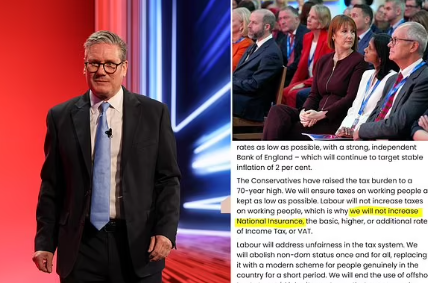The UK saw the biggest rise in legal immigration of any major country last year, according to a report.
The OECD put Britain at the top of the international table after long-term inflows increased by nearly 53 per cent to a record 750,000.
That was a larger increase than any other European state, and a more significant jump than the 13.4 per cent seen in the US.
America was still the top destination with 1.2million arrivals, a peak since 2006.
The global organisation monitors migration trends across all its members, standardising figures as much as possible.
The Tories pointed out that when in government they brought in measures to crack down on migrants bringing in dependants, as well as the now-scrapped deal with Rwanda for illegal arrivals.
Keir Starmer has insisted he is ‘not relaxed’ about net migration levels – which are forecast to fall, but remain at an historically-high 315,000 a year in the medium term.
The latest report ignores Ukrainians seeking asylum amid the fallout from the Russian invasion.
Overall OECD countries saw a total inflow of more than 6.5million people in 2023, up 10 per cent on the previous year and 28 per cent from 2019.
‘Following an unprecedented increase in 2023, the United Kingdom rose to second place with a record 750,000 new migrants (250 000 more than in 2022, +52 per cent),’ the report said.
‘Germany, which had been the second OECD destination since 2012, fell to third place despite an increase of 4 per cent and nearly 700,000 new permanent-type entries.
‘Canada followed with 470 000 new permanent migrants (+7.8 per cent), and Spain recorded a 12 per cent increase to 360 000.’
The report flagged that the Tories had brought forward measures including tightening up the Skilled Worker visa route and curbing overhauling shortage occupation rules.
It also pointed out that as well as the UK, Australia, Canada, France, Finland, Japan, Korea, Luxembourg and Switzerland all registered record immigration in 2023.
The OECD report noted that the UK had been planning to send Channel migrants to Rwanda before Labour took power.

Overall OECD countries saw a total inflow of more than 6.5million people in 2023, up 10 per cent on the previous year and 28 per cent from 2019

Keir Starmer has insisted he is ‘not relaxed’ about net migration levels – which are forecast to fall, but remain at an historically-high 315,000 a year in the medium term
‘However, following the elections early July 2024, the new Prime Minster has indicated that the government will abolish the policy and terminate the agreement with Rwanda,’ it added.
Shadow Home Secretary Chris Philp said Labour was mounting ‘an ideologically driven push to can that legacy, which would open the doors to migration and undo all the progress we made’.
‘I call on Labour to reinstate the further changes to reduce migration that we initiated when in Government, that were due to take affect in April 2025 and which Labour has now cancelled,’ he said.
In September Sir Keir set out measures to cut over-reliance on migrant labour and boost training in the UK to fill vacancies.
He announced a push to link visa policies to skills needs, so that immigration is not used as an alternative to training or tackling workforce problems.
The Migration Advisory Committee has been asked to highlight key sectors where labour market failures have led to soaring overseas recruitment and provide an annual assessment to ministers.
The Government is also overhauling the rules around migrant sponsorship to ensure employers guilty of flouting employment laws are banned from hiring from abroad.
The PM said at the time: ‘It is the policy of this Government to reduce both net migration and our economic dependency on it.
‘I have never thought we should be relaxed about some sectors importing labour when there are millions of young people, ambitious and highly talented, who are desperate to work and contribute.’

At the Budget the Treasury’s OBR watchdog predicted that net migration will drop to 315,000 a year in the ‘medium term’
At the Budget the Treasury’s OBR watchdog predicted that net migration will drop to 315,000 a year in the ‘medium term’.
That would be nearly as much as recorded in the run-up to the EU referendum in 2016.
‘We forecast net migration to fall from 740,000 in the year to June 2023, 68,000 higher than estimated in March due to ONS revisions, to reach 315,000 in the medium term,’ the watchdog said.
‘Net migration has already fallen to 685,000 in the year to December 2023. And more recent Home Office data, covering the period until the second quarter of 2024, show visas granted falling sharply.
‘This largely reflects government restrictions coming into force in the first half of this year, which we now expect to have a slightly larger impact than we anticipated in March.’
Reform UK Deputy Leader, Richard Tice said: ‘For fourteen years the Tories promised us action on immigration and instead all we were left with was the highest numbers on record.’




